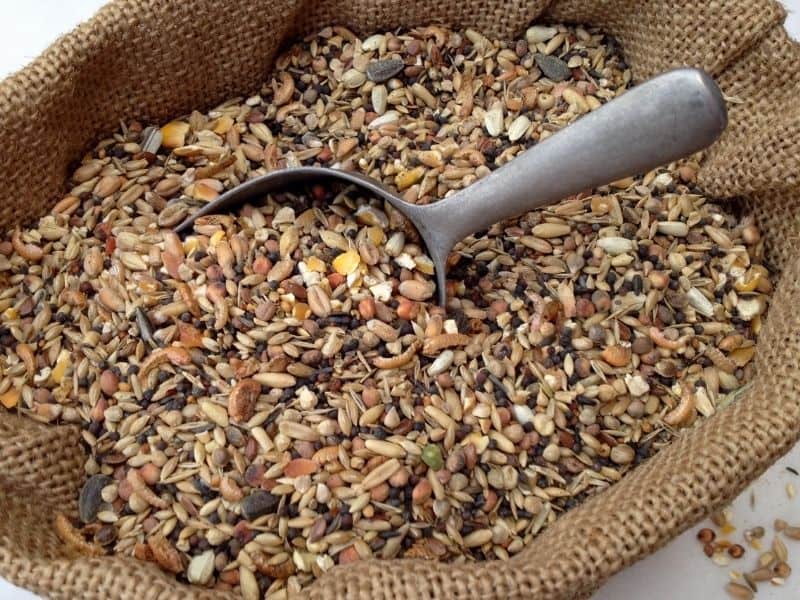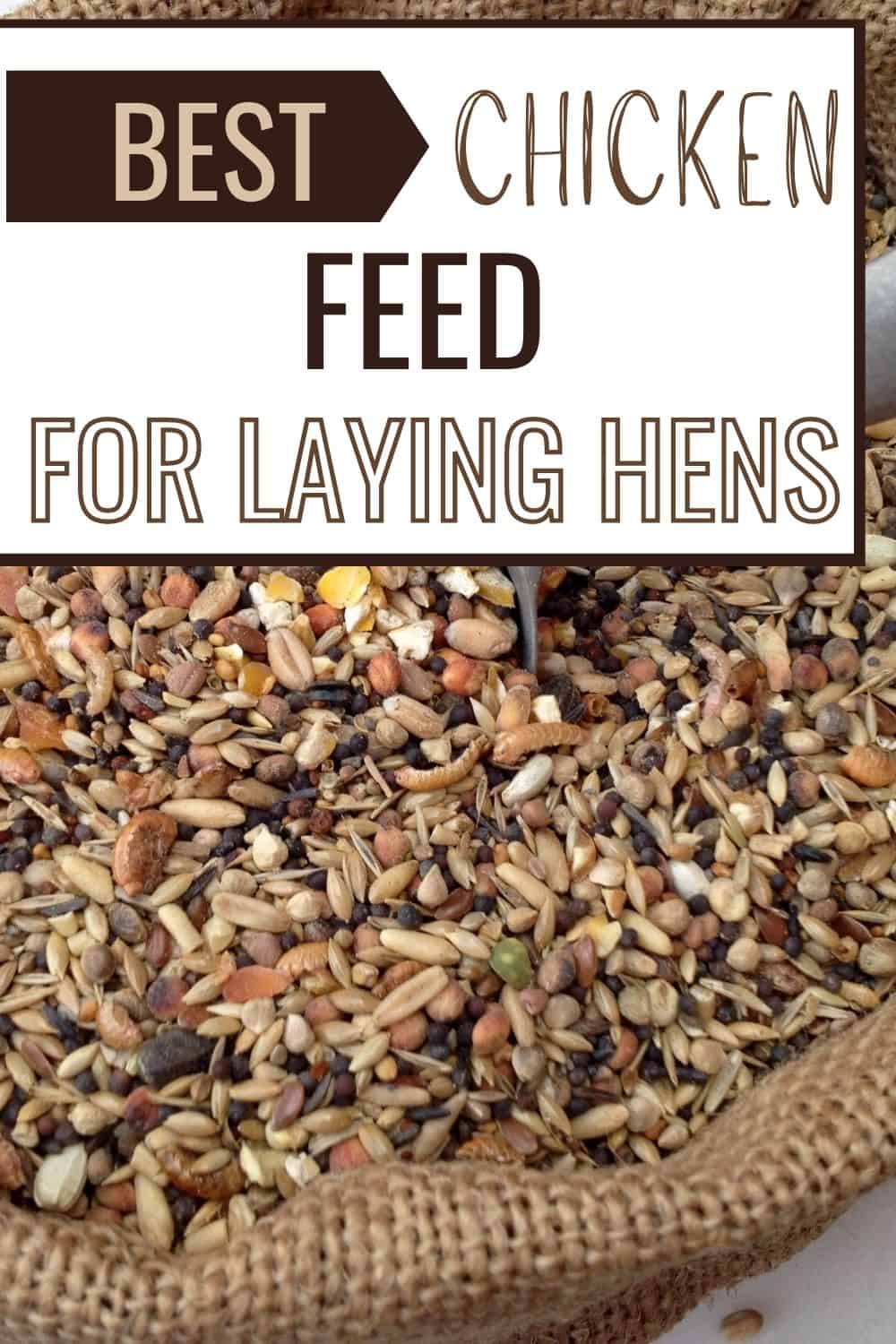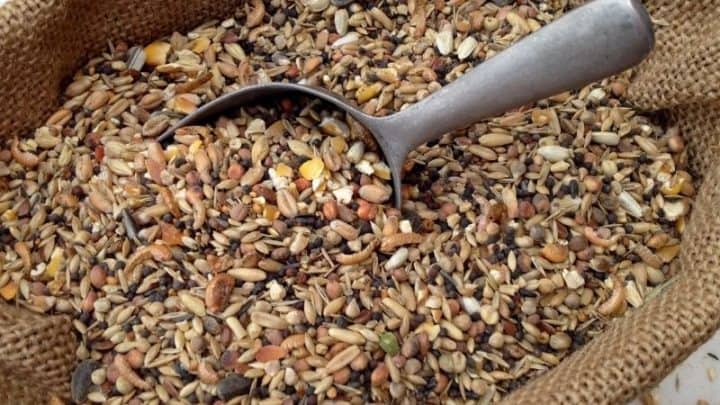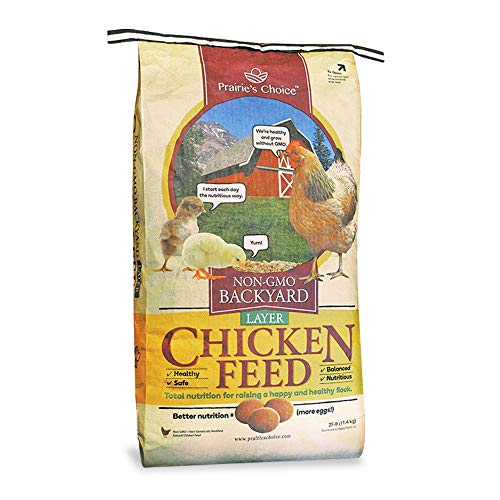When it comes to raising a healthy flock of hens, one of the most important factors is the type of feed that you use. Although with so many different types of chicken feed on the market today, choosing the right feed for your hens may seem difficult, in this article, I will lay out the best chicken feed products on the market!

Even with the many aspects to consider when choosing the right chicken feed, I have ranked these products in order of their importance throughout the entire laying process. From the best supplement to the best and worst table scraps and fodder, these are the 10 best chicken feeds for laying hens.
At A Glance: OUR TOP PICKS FOR CHICKEN FEEDS FOR LAYING HENS
- Our Top Pick: Manna Pro Organic Layer Pellets
- Manna Pro Crushed Oyster Shell
- Manna Pro 7-Grain Ultimate Chicken Scratch
- Scratch and Peck Feeds Naturally Free Organic Starter Chick Feed
- Manna Pro Medicated Chick Feed Starter Formulated with Amprolium
- Prairie’s Choice Non-GMO Backyard Chicken Feed
- Purina Layena Nutritionally Complete Layer Hen Feed
- Kaytee Laying Hen Diet
- Prairie’s Choice Non-GMO Backyard Chicken Feed Layer Formula
The type of feed that you offer to your hens will play a vital role in their overall health, and can ultimately affect their egg production as well. With this in mind, it is extremely important to choose the right feed for your hens not only to keep them healthy but to keep them producing high-quality eggs throughout their entire laying cycle. Check out the 8 best laying chicken breeds.
Learn more about raising chickens for eggs.
The 10 Best Chicken Feed For Laying Hens
1. Manna Pro Oyster Shell
When it comes to your supplements, grit is highly recommended for all chickens because it helps digestion by further breaking down scratch grains and feed. However, for laying hens, grit with extra calcium is a necessity.
Extra calcium in your hens’ diet is highly recommended helping them produce strong eggshells and, as far as supplements go, Manna Pro Oyster Shell is the best option for any chicken you are raising.
Containing both crushed oyster shells and coral calcium, it provides all of the extra calcium needed for hens to produce strong eggs, and is also heat-treated to retain its purity, so you know you’re getting a quality product!
Manna Pro brand oyster shells are a pellet-size, soluble grit, so they can be fed to either your pullet or adult laying hens starting at 18 weeks of age. The oyster shell is then broken down and absorbed through your hens’ digestive system to be stored for later use!
It is possible to mix this in with your layer feed, however, I recommend using this product in a separate feeder mixed with their normal grit to ensure they are getting enough in their diet.
There is a possibility of bigger chunks being present in your bag, however, these are easily broken apart to make them once again edible for your hens!
Available in 5-pound bags on Amazon or 50-pound bags in local feed stores, Manna Pro Oyster Shell is the best feed option for a calcium-fortified grit supplement and a must-have for your laying hens!
Pros:
- 33%-38% extra calcium to help fortify eggshells
- Pellet-sized for your hens’ convenience
- Heat-treated to ensure the purity of calcium
- Recommended for all egg-laying hens
- Comes in a 5-pound and 50-pound bag
- Amazon provides subscribe and save options
Cons:
- Amazon only carries the 5-pound bag
- Some Amazon reviewers have claimed to receive bags of this product that were chunks of oyster shells rather than crushed.
For product purchasing information, subscribe and save options, or to read any reviews, you can find Manna Pro Oyster Shells in the 5-pound bag here on Amazon.
2. Manna Pro 7-Grain Ultimate Chicken Scratch
As far as necessities go, scratch grains are just as important to your hens’ overall health as the grit you will choose to use. Although they are low in nutritional value, scratch grains are recommended to encourage the natural foraging-like behavior in cooped birds and are an added treat for your hens!
Once again, Manna Pro leads the pack, as far as scratch grains go, with their 7-Grain Ultimate Chicken Scratch, which is a non-GMO feed made with all-natural ingredients and is available on Amazon in a 10-pound bag.
The seven grains included in the Ultimate Chicken Scratch are US-grown purple corn, wheat, milo, barley, oats, sunflower seeds, and millet for a more nutritious feed choice for hens. It is also made with no artificial colors or flavors for an all-natural chicken scratch.
Manna Pro Ultimate Chicken Scratch also contains zero cholesterol, MSG, and trans-fats to ensure healthy chickens while providing them with a treat to break up regular feedings. This type of scratch is intended for more mature birds, and should not be given to hens less than 8 weeks of age.
You can either offer this product in a feeder or scatter it directly on the ground, however, it is also highly recommended to use oyster shells to aid in digestion. It is also highly recommended to inspect any feed for any mold or abnormalities before offering it to your hens.
Pros:
- More nutritional than normal scratch grains
- 7-Grain mix of purple corn, wheat, milo, barley, oats, sunflower seeds, and millet
- All-natural ingredients
- Non-GMO
- No artificial colors or flavors
- Provides energy
- Zero cholesterol, MSG, and trans fat
- Subscribe and save options available on Amazon
Cons:
- Only available in 10-pound bags
- Only for hens older than 8 weeks of age
- Not nutritious by itself
- Some Amazon reviewers have claimed to have received bags infested with bugs.
To read reviews on this product, or for purchasing information, as well as the subscribe and save options available, you can find the 10-pound bag of Manna Pro 7-Grain Ultimate Chicken Scratch here on Amazon!
3. Scratch and Peck Feed Naturally Free Organic Starter Chick Feed
The type of feed you use for your starter chicks will serve as the foundation for the health of your flock and your baby chicks require feed with a high protein content to ensure healthy development.
For those of you who don’t want your chickens to have corn in their diet, Scratch and Peck Feeds Naturally Free Organic Starter Chick Feed contains a minimum of 20.5% protein, is soy and corn-free and is without a doubt the best option for a starter chick feed.
Using non-GMO ingredients proudly grown and milled in the Pacific Northwest, this product is available in either 10, 25, or 40-pound bags, and is unprocessed to provide raw nutrients to your hens, and is also perfect for growing fodder.
To provide the highest nutritional value possible, this Scratch and Peck Feeds product contains organic feed grains, flax meal, fish meal, as well as added vitamins and minerals essential to your baby chickens!
Because this is a raw and unprocessed organic feed, it is highly recommended to carefully inspect it for any mold or bug infestations before offering it to your feathered friends!
Pros:
- Non-GMO
- All-natural ingredients
- Made in Pacific Northwest
- Soy-free and Corn-free
- Contains no medication or antibiotics
- Special nutritional blend for chicks
- Offers more protein than other brands
- Offers a longer shelf life than most brands of chicken feed
- Available in 10-pound, 25-pound, and 40-pound bags on Amazon
Cons:
- Some customers found their hens’ droppings to smell more after using this product
- As an organic feed, it can be a little pricier in comparison to other brands
To conduct further research, review product information, or for purchasing options, you can find Scratch and Peck Feeds Naturally Free Organic Starter Chick Feed, specifically the 25-pound bag, here on Amazon.
4. Manna Pro Chick Starter
When considering feed options for your baby chicks, Manna Pro Chick Starter is another great choice for the continued development of healthy chickens. While it does contain GMO ingredients, it is a complete feed for your baby hens.
Not only is this a complete feed that is perfect for starter chicks up to 16 weeks of age, but it’s also packed with extra vitamins and minerals to help promote healthy growth and proper development for your baby chicks.
Manna Pro Chick Starter is a crumble feed, containing a minimum of 18% protein, which is perfect for your young hens to get started and is also medicated with amprolium to help prevent the development of coccidiosis, which is a very common intestinal disease in baby chicks.
Although this feed does contain less protein than other starter feeds available, it is designed to be used as a grower feed as well. Chickens older than 18 weeks of age only require 16% protein in their daily diet. However, this product is only available in 5-pound bags, so it may not be the best option to use as a grower-only feed.
While this is a crumble feed, it is important to check your bag for any fine powder, because this is inedible for your baby chicks! As always, inspect all feed for mold, infestations, or abnormalities before offering it to your hens.
Pros:
- Packed with vitamins and minerals to promote healthier development
- Medicated with amprolium to help prevent coccidiosis
- Complete feed perfect for young chicks up to 16 weeks of age
- Crumbles form to reduce waste and easier for chicks to eat
- Subscribe and save options on Amazon
Cons:
- Only available in a 5-pound bag
- Less protein in comparison to other brands of starter feed
- Crumbles may become powdery during shipping, which your chicks can’t eat ( we learned a trick: mix the powder with some wet food scraps, such as fresh tomato juice, and the babies will love it!)
- Some customers have received expired feed bags on Amazon
To review product information, read customer reviews, or for purchasing options, Manna Pro Chick Starter can be found here on Amazon.
5. Prairie’s Choice Non-GMO Backyard Grower Chicken Feed
Prairie’s Choice Non-GMO Backyard Chicken Feed – Grower Formula, 25lbs
One of the best options for grower feed is Prairie’s Choice Non-GMO Backyard Chicken Feed, because of the balanced nutrition it offers for chickens up to 18 weeks of age.
Prairie’s Choice gluten-free and non-GMO feed is non-medicated and made with all-natural ingredients from the Pacific Northwest to ensure a high-quality feed for your chickens!
This product does contain extra fiber, phosphorus, salts, fats, and also provides additional nutrients such as folic acid, vitamin A, B-12, D, and E, as well as a minimum of 0.8% of extra calcium to keep your flock as happy and healthy as possible.
This grower formula is a crumble feed, which is easier for younger hens to eat and digest, because of this it can be used as a starter feed for your baby chickens as well and is available in a 25-pound bag!
It does contain a minimum of 18% protein, which is perfect for hens older than 6 weeks of age, however, it contains less protein than other starter feed-specific formulas that are available.
Pros:
- Perfect for chickens up to 18 weeks of age
- All-natural ingredients
- Non-GMO and gluten-free
- Non-medicated
- Balanced nutrition
- Easy to digest
- Made in the USA
- Extra vitamins and minerals to ensure the proper nutrition of your hens
- Available in a 25-pound bag on Amazon
Cons:
- Less protein than other starter feeds
- Pricier than other brands
- Some Amazon reviewers claimed their bag was bug-infested
- Easily mistaken for layer formula during Amazon searches
For customer reviews, detailed nutritional information, and purchasing options, Prairie’s Choice Non-GMO. Backyard Grower Chicken Feed can be found here at Amazon!
6. Purina Layena + Omega 3
One layer feed that is highly underrated in my opinion is Purina Layena + Omega 3. This product provides all 38 basic nutrients essential to the health of your chickens as well as added omega 3 fatty acids and amino acids for healthier chickens as well as higher quality egg production.
The extra fatty acids provided by this feed result in five times more nutrient-rich eggs than store-bought eggs, and also contains vitamin D and manganese to provide more calcium to your growing hens!
Layena + Omega 3 also contains marigold extract to provide a brighter, more colorful yolk as well as both prebiotics and probiotics to help support your hens’ immune system and digestive health!
This product is a pellet-style feed, and is specially designed as a layer feed for hens older than 18 weeks of age and contains a minimum of 16% protein to promote a healthy chicken and a minimum of 3.5% calcium to promote stronger eggshells!
With the extra calcium and added nutrients in your hens’ diet, this is the best option in layer feed on the market available in both 10-pound and 40-pound bags, however, it can be a little pricier than other chicken feed brands.
Pros:
- Produces egg rich in omega 3 fatty acids
- Marigold extract for a brighter yolk
- Essential amino acids for healthier chickens and better eggs
- Prebiotics support the immune system
- Probiotics Support digestive health
- 16% protein, 3.50% calcium healthy chickens, and more reliable egg production
- Available in 10-pound and 40-pound bags on Amazon
Cons:
- For hens older than 18 weeks of age
- Pricier than other brands due to added nutrient values
For customer reviews, specific ingredient information, or purchasing options, Purina Layena + Omega 3 can be found in the 10-pound bag here, or the 40-pound bag here on Amazon.
7. Kaytee Laying Hen Diet
Kaytee Laying Hen Diet is another good option when it comes to layer feed because it also contains extra calcium for stronger eggshells and essential amino acids to balance the nutrition of your flock, and is available in both 10-pound and 25-pound bags on Amazon.
In comparison to Layena +, this pelleted feed also contains a minimum of 16% protein, probiotics to support good digestive health, added vitamins and minerals, as well as a marigold extract for brighter colored yolks!
However, unlike Layena +, this layer feed does not contain probiotics to support the immune system and has also been reviewed by some customers as inconsistent in terms of egg production.
Although this is a complete feed, and vegetarian as well, it does contain various types of corn and soybean meal for those of you who don’t want your hens to have this unnecessary filler!
This product does have inconsistent availability on Amazon, which is why it ranks so low on my list, and due to where this feed is made, it may contain small particles of peanuts and tree nuts; those of you with any food allergies should keep this in consideration as well when choosing this feed.
Pros:
- 16% protein to ensure proper growth
- Balanced amino acids to promote proper nutrition
- Probiotics to support digestive health
- Extra calcium for strong eggshells
- Marigold Extract for brighter colored yolks
- Complete feed for a balanced nutrition
- Available in both 10-pound and 25-pound bags
Cons:
- It May contain peanuts or tree nut particles
- Some Amazon reviewers have claimed that the egg production rate is not as consistent as other brands
- Some customers claimed to receive moldy feed
Customer reviews, ingredient information, as well as purchasing options and availability for Kaytee Laying Hen Diet, specifically the 10-pound bag, can be found here on Amazon.
8. Prairie’s Choice Non-GMO Backyard Layer Chicken Feed
As far as a layer feed goes, Prairie’s Choice Backyard Layer Chicken Feed is another great choice for maintaining healthy chickens and due to the balanced nutrition that it offers!
Specially formulated for laying hens, this non-GMO feed is considered a complete feed, containing a minimum total of 16% protein and 2% calcium to provide your hens with all their nutritional needs.
This product is made with all-natural ingredients and can be given to hens starting at 16 weeks of age, however, this type of feed can be easily mistaken for the grower formula on Amazon because it is also available in 25-pound bags.
For those opposed to offering corn or soy to your chickens, this product does contain non-GMO corn and soybean meal that is not chemically processed as well to provide proper nutrition to your flock.
While this is a good feed for your hens, the availability can vary on Amazon, which is why this product is lower on my list than the other types of layer feed.
Pros:
- Non-GMO
- Formulated for egg layers
- Complete nutrition for healthy and productive hens
- Minimum 16% protein, and 2% calcium
- Available in 25-pound bags
Cons:
- Easily mistaken for grower formula during Amazon searches
- Availability will vary on Amazon
- Contains corn and soybean meal
Detailed customer reviews, ingredient listing, and purchasing information for the 25-pound bag of Prairie’s Choice Non-GMO Backyard Layer Chicken Feed can be found here on Amazon!
9. Homemade Chicken Feed
If you are looking for a potentially more cost-efficient feed for your hens, a homemade chicken feed may be one of the best options for you!
By making your own feed, you can provide a more natural and more nutritious feed for your chickens than traditional store-bought feeds by including only the grains that you know your chickens will love!
The main ingredients in your homemade chicken feed can include:
- Alfalfa – great for winter storage and high in protein
- Field peas – high in protein and will help avoid the use of soybeans
- Wheat – higher in protein and amino acids than corn
- Corn – a go-to for all chickens, however, many people avoid the use of corn due to the lower nutritional value
Ingredients that are recommended for additional nutrients can include:
- Oyster shells – as a grit to help break down the grains, as well as provides extra calcium for your laying hens
- Flaxseed – provides more omega-3 fatty acids to produce higher quality eggs
- Kelp – provides extra minerals to your flock
- Cultured yeast – provides B vitamins as well as extra minerals and digestive enzymes
- Fish meal – for added protein and extra omega-3 fatty acids
- Prebiotic and probiotic supplements – used to boost the immune system as well as promote a healthy digestive system
While this can be better for your hens since you can make it how you want it, it may take a little longer to perfect your formula. This could result in making your feed more costly at first, however, after you have found the recipe that best suits your needs, will ultimately be the best option in terms of affordability. However, there are multiple recipes available to you online to help get you started!
Pros:
- It can be more nutritious than store-bought feeds
- You can ensure the use of high-quality ingredients
- Most ingredients can be homegrown
- Normally more cost-efficient than store-bought
- Multiple recipes available online to help get you started
- Make it how you want it
Cons:
- It may take longer to create a recipe that your hens like
10. Table Scraps & Home Grown Fodder
Table scraps and fodder can be a tasty treat to your feathered friends, as well as reduce the amount of store-bought feeds required to keep your chickens happy and healthy.
Using table scraps is also a more eco-friendly type of feed because when you use table scraps as a source of feed you will also reduce the amount of waste that you produce!
Although it is not recommended to feed your chickens table scraps until at least 8 weeks of age, some healthy forms of table scraps include both raw and cooked vegetables, bread in moderation, as well as certain fruits which can all be very nutritious when added to the diet of your hens!
While your flock will eat almost anything you offer to them, there are unhealthy table scraps that you should always avoid as a type of feed.
These unhealthy options include:
- Green potatoes – they contain solanine that can affect the nervous system of your flock
- Citrus fruits – these types of fruit can affect the egg production of your flock, as well as cause diarrhea
- Avocado pits and skins – these parts of the avocado contain persin, a toxin that can potentially fatal to your flock, however, the meat is edible.
- Dry or uncooked beans – these contain the toxin hemagglutinin, which can affect both the health of you and your flock by causing red blood cells to clump together
- Chocolate – contains theobromine, which is dangerous to the health of all pets
- Onions and garlic – this could potentially alter the flavor of your eggs, as well as lead to the development of Heinz Anemia, which results in weaker legs in your chickens and a more lethargic look to your flock.
- Raw meat – can contain parasites as well as diseases as well as potentially make your hens more aggressive.
- Raw eggs – this can cause your hens to eat eggs from their nesting boxes; instead of raw eggs, try scrambled to avoid this behavior
- Moldy or rotten food – as a general warning, you should always avoid offering moldy or rotten feed to your flock because this can cause health issues.
Growing your own fodder will also reduce the amount of store-bought feed your chickens consume, encourages your hens to forage, and is also an extremely nutritious type of feed.
While whole-grain wheat and barley are two of those common types of fodder, there are many viable options when it comes to growing your own fodder for feed including oats, alfalfa, clover, and sunflower seeds!
While it is easy to grow your own fodder as a type of feed, if you do not have the means to build a fodder system, this can be a more costly method to implement at first.
Pros:
- Table scraps are a cost-efficient feed source
- Reduces household waste
- Fodder is an extremely nutritious feed source
- Reduces feed bill
- Fodder encourages foraging behavior in your hens
Cons:
- A fodder system can be costly if you don’t have the means to build your own.
- Increased risk of your chickens getting sick through table scraps
- Table scraps are for hens 8 weeks of age and older
Frequently asked questions about chicken feed
1. Is it better to feed chickens pellets or crumbles?
Crumble feed can be potentially easier for your hens to eat because of its softer consistency and due to not needing the grit to break it down, however, pellet feed is more consistent in terms of nutritional standards because each pellet is a consistent size, and contains the same amount of nutrients from pellet to pellet.
2. Are crushed oyster shells the same as grit?
No, crushed oyster shells are a soluble grit, which is absorbed into their body, that is intended to be used as a supplement to add to the normal grit you use. Grit is not required until you start feeding scratch grains or anything other than crumble type feed to your hens’ after 8 weeks of age to aid in digestion.
3. How many times per day should I feed my chickens?
While chickens will need constant access to a food source, it is recommended to feed them at regular intervals only twice per day, once in the morning and once at night. It is also recommended to start with roughly a quarter pound of feed per chicken per day, however, you should check feeders and make sure that your chickens have enough feed and grit in between feedings.
4. Is corn bad for chickens?
In addition to a proper diet, corn can be a treat for your chickens. By itself, however, corn is considered bad for your chickens because it can lead to weight gain in inactive chickens, as well as being low in fatty acids, vitamins, minerals, and amino acids, which are essential for a healthier chicken to thrive.
5. Is sweet feed bad for chickens?
Sweet feed by itself is bad for your chickens because, just as with corn, it doesn’t contain enough amino acids to promote the health of your flock. Sweet feeds also contain an excess of fiber while being too low in calcium and phosphorus to be of nutritional value to your hens.
6. How can I make chicken feed last longer?
One of the easiest and cheapest ways to make your feed last longer is to offer your hens table scraps, fermenting your feed, or by growing your own fodder. A more costly method to make your feed last longer is to make your own feed and mix it with the current bag of feed.
7. What are the benefits of fermenting chicken feed?
Fermenting your chicken feed will actually increase the nutritional value of your feed compared to dry feed alone. Fermented feed also contains naturally occurring probiotics to ensure digestive health in your flock, as well as stripping the grains of any anti-nutrients that prevent the casing from being fully broken down during digestion. Fermenting your feed will also cause your hens to require less feed because they are getting more of the nutrients required than in the same amount of dry feed.












Quick Guide To Raising Backyard Chickens
Thursday 28th of July 2022
[…] Best Chicken Feed For Laying Hens […]
Raising Bantam Chickens In Your Backyard (Favorite Breeds)
Sunday 11th of April 2021
[…] popular breeds to raise in smaller urban areas as a backyard flock. Banties also use a lot less chicken feed […]